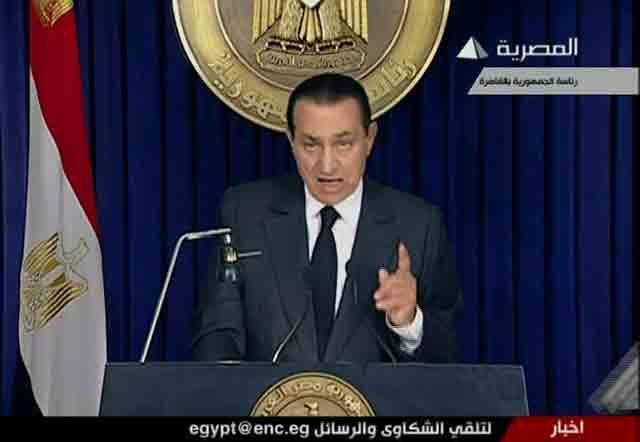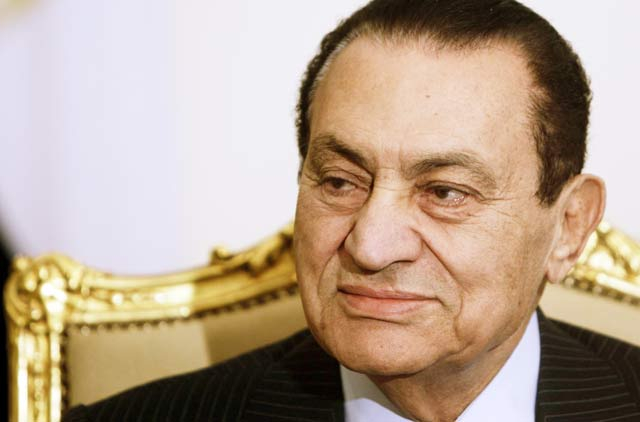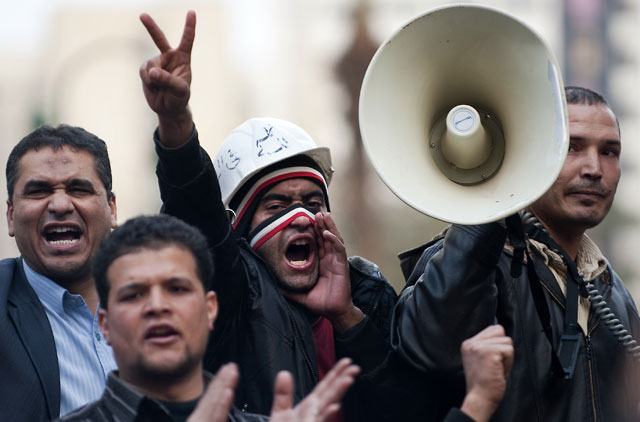Gulf News Report: Egyptian President Hosni Mubarak late Thursday night (early Friday morning UAE time) announced that he would stay on as president but transfer some powers to his deputy Omar Sulaiman, squashing speculation and rumours that he was about to resign.
Mubarak, in a televised address to the nation, said he was immediately instigating steps to allow a peaceful transfer of power following elections in September.
"I have expressed with all clarity my intention not to stand in forthcoming elections," he said.
"I will not accept to be dictated orders from the outside no matter what the source is and no matter what the justifications are," he said, responding to calls from abroad for him to step down.
Before the televised speech, speculation was rife that Mubarak, who has been in power for some 30 years, would relinquish power after 17 days of widespread street protests.
State television broadcast footage of Mubarak meeting at the presidential palace with Sulaiman, who is seen as a possible successor.
But there has also been speculation that the army may take over, with the Supreme Council of Egyptian Armed Forces meeting in a "continuous session" to discuss measures to "safeguard" the country.
The protesters, however, may not accept military leadership. Large groups of people in central Cairo's Tahrir Square have been chanting "Civilian rule, not military rule."
More than 1 million demonstrators have gathered in and around the square, which became the focal point of the protests, in anticipation of Mubarak`s speech.
Earlier in the day, a senior army official had told the cheering protesters, "All your demands will be met tonight."
Hossan Badrawi, the secretary general of the ruling National Democratic Party, said that he would like Mubarak to "step aside" and would be "surprised" if he were still in power on Friday.
Prime Minister Ahmad Shafiq, meanwhile, had told the BBC that the president may step down. State media reported that he too met with Mubarak on Thursday evening.
The 82-year-old president had earlier rejected calls to step down, instead promising not to seek re-election after his term ends in September. His government had also shown willingness to implement political reforms in the last few days.
But thousands of demonstrators stood their ground in the Egyptian capital on Thursday, while public and private sector workers in various parts of the country continued to go on strike.
The protesters were also called upon to join a second "1-million- strong rally" on Friday.
Foreign Minister Ahmad Abu Al Geit had warned in interviews with Arab and US media that armed forces could be forced into action "if chaos erupts."
"Such a step could lead to a very dangerous situation," he said in an interview broadcast by Al Arabiya television on Thursday.
Tanks have been stationed outside Mubarak`s residence in the Cairo suburb of Heliopolis during the protests.
Jubilation in Tahrir Square turns to anger and gloom
Meher Murshed, Senior Hub Editor, writes: The roar of thousands occupying Tahrir Square yesterday gave way to chants of ‘leave, leave’ as President Hosni Mubarak swore that he would die in Egypt.
As Mubarak appealed to his “children” to restore calm and unite for the good of Egypt, the buzz that had enveloped Tahrir Square in anticipation of his departure turned into a hushed silence at first.
Chants of Irhal, Irhal (leave) then reverberated as the protesters exploded in anger.
Joy was aborted after the hours of pregnant anticipation. Tahrir Square could not believe what they were hearing.
Earlier in the evening when reports circulated that Mubarak was apparently going to step down, a carnival-like atmosphere gripped Tahrir Square and spread to remote parts of Egypt. After two weeks of protests and hundreds of deaths, their dream was about to become reality.
A military cordon deployed around the square to contain the protest, backed by a column of tanks, had not moved and there was no sign of any crackdown, as joyful crowds chanted: “The army and the people are one hand!”
But as the thousands celebrated, many doubted that Mubarak would actually go. And then a little past 10.30pm, Egypt realised Mubarak, in power for 30 years, was staying.
But Tahrir Square soon showed the same resilience — they would not give up.
I have laid down a clear vision to resolve the crisis, says Egyptian President Hosni Mubarak said on state television.
Egypt's Information Minister Anas Al Fekky told Reuters "the president is definitely not going to step down", shortly before Hosni Mubarak's address to the nation was to be broadcast.
Mubarak speech expected at 2000 GMT: government
Cairo: Egyptian state television showed images on Thursday of President Hosni Mubarak in a meeting with his deputy Omar Sulaiman.
Mubarak sat behind a desk in silence while the vice president was talking, the footage showed. It was not immediately clear when it was filmed, though the channel said the meeting was happening now.
Egypt's military takes control, CIA expects Mubarak will step down on Thursday, says AP report.
Egypt's President Hosni Mubarak will step down on Thursday night following mass protests against his 30-year rule, NBC News reported.
NBC's Richard Engel said two independent sources have confirmed that Mubarak will step down.
In Cairo, however, a cabinet spokesman told Reuters a decision about Egypt's president staying or leaving was due in hours.
Destination of presidential plane still unknown
Duraid Al Baik, Associate Editor, reports from Dubai: Informed sources in Egypt denied on Thursday Al Arabiya reports about Hosni Mubarak leaving Cairo to Sharm Al Shaikh. The presidential plane is ready and on the runway, the sources say.
A source, who spoke on condition of anonymity, said no solid information about the destination of the plane is available.
He said negotiation is under way between the army on one side and the president and the vice president on the other hand to discuss the departure of Mubarak.
What we know at this moment is that Mubarak is still in Cairo and the road to the airport is blocked by the army.
Egypt's army is expected to make a statement on Thursday in which it will respond to the demands of protests, satellite television said.
It said the higher council of the armed forces had held a meeting, but gave no further details.
Egyptian President Hosni Mubarak could "respond to the people's demands by Friday," the secretary general of his ruling National Democratic Party Hossam Badrawi told the BBC.
Thousands more Egyptian demonstrators joined a mounting tide of protest against President Hosni Mubarak's regime on Thursday, despite stark threats of a government crackdown.
Surrounded by tanks and the world's television cameras, the protesters in Cairo's Tahrir Square are bedding down to secure their place in history.
Egypt's government on Thursday warned of a military crackdown as massive rallies against President Hosni Mubarak spread and reports surfaced that the army had detained and tortured pro-democracy activists.
The revolt now holds two permanent protest camps in Cairo, blocking both the parliament building and the city's iconic Tahrir Square with noisy rallies staged under the watchful gaze of government troops.
Both sides have toughened their rhetoric, with Vice President Omar Suleiman tacitly threatening to turn to the military to regain control. In response, the protesters moved to blockade parliament and reinforce Tahrir.
"No to Sulaiman. No to American agents. No to Israeli spies. Long live Egypt. Down with Hosni Mubarak," they chanted in the street outside parliament, now lined with makeshift shelters and anti-regime posters.
Soldiers were deployed to protect the building but, to the amazement of many activists more used to the strong-arm tactics of Mubarak's regime, they made no attempt to dislodge the growing protest.
"If we don't die here we'll die in prison, I'd prefer to die here," said Attiya Abuella, 24, an unemployed graduate who said he had been jailed last year for 60 days, often naked and in chains, for taking photographs.
Hundreds stay strong
Hundreds of demonstrators marched on parliament from the epicentre of the uprising in Cairo's Tahrir Square on Wednesday, a day after the largest protests since the revolt began, as unrest spread across the nation.
Foreign Minister Ahmed Abul Gheit warned the army, until now a mostly neutral force, would intervene if the protests against Mubarak's 30-year-old US-backed rule escalated.
"If chaos occurs, the armed forces will intervene to control the country, a step... which would lead to a very dangerous situation," the official Mena news agency said, paraphrasing Abul Gheit's interview with television channel Al Arabiya.
His remarks came after newly appointed Vice President Omar Sulaiman warned of a possible "coup" in the absence of a peaceful transfer of power.
Abul Gheit slammed the United States for "imposing" its will on Egypt by demanding immediate reforms.
"When you speak about prompt, immediate, now, as if you are imposing on a great country like Egypt, a great friend that has always maintained the best of relationship with the United States, you are imposing your will on him," he said.
Shortly after his comments, Washington renewed its calls on the Egyptian army to show restraint.
The protesters however showed no sign of backing down on their demand for Mubarak to go as tens of thousands of people filled Cairo's Tahrir Square well into the third week of a revolt.















